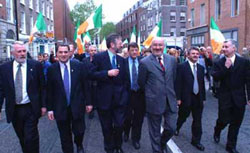 |
Irisch
Republikanische Solidarität
|
 |
PMs TAKE STOCK
British Prime Minister Tony Blair and 26-County Taoiseach Bertie
Ahern appear to have moved away from plans for a 'shadow'
Six-County Assembly in Belfast, but are still not revealing any
proposals for reviving the peace process.
The two met in London after multi-party talks in Belfast, due to
be held yesterday, were cancelled on short notice. Ian Paisley's
DUP is continuing to refuse to speak with Sinn Fein and appears
implacably opposed to any movement towards sharing power with
republicans.
Speaking in Downing Street, Mr Ahern said the two governments
still wanted to implement the 1998 Good Friday Agreement "as
fully, completely and inclusively" as possible, and he maintained
he and Mr Blair remained confident they could achieve success
during the course of this year.
The two were said to have identified "a number of strategies"
to
restore a power-sharing administration to the North of Ireland by
the end of the year. A new plan is to be revealed ahead of this
summer's Protestant marching season.
While appealing to the political parties for their support, Mr
Ahern also declared: "if it's left to the two governments, the
two governments will give the leadership and take the decisions,
if that's the way it has to be."
There had been strong opposition from nationalists to proposals
by the two governments to create a forum at Stormont without the
devolved powers previously enjoyed by the Belfast Assembly.
However, there are continuing suggestions from London that a
so-called 'transitional Assembly' at Stormont, which would be
allowed to handle some day-to-day governmental tasks, should be
set up.
This Assembly would be required to "go live" with devolved powers
and a power-sharing Executive at a specific date in the future.
If it failed to win the support of the DUP, the Stormont Assembly
would be consigned to the history books and an alternative
strategy developed.
Sinn Fein president Gerry Adams has written to Taoiseach Bertie
Ahern and British prime minister Tony Blair, insisting on the
immediate restoration of the North's power-sharing institutions.
But in a significant development, Sinn Fein has said that the two
governments should carry out "joint government decision making"
if the DUP refuses to share power.
It has long been believed that the DUP's intransigence must lead
the two governments to the putative 'Plan B' -- some form of
joint authority.
Mr Adams called for the two governments to meet all the parties
and unveil "a timetable by which suspension will be lifted and an
executive formed".
"This should be completed before the summer and well in advance
of the loyalist marching season," he said.
"If the DUP rejects this, then the two governments should, on the
basis of joint government decision making, get on with delivering
those many parts of the Good Friday Agreement that they have
direct responsibility for."
Commenting on the Taoiseach's remarks yesterday, SDLP deputy
leader Alasdair McDonnell MP said: "The British government's plan
for a shadow assembly was a lousy idea that had no potential and
it is good that they are now rethinking it."
The SDLP are also opposed to any moves that could interfere with
North-South relations under the Agreement.
IRA 'NO LONGER A THREAT'
It was seen as no coincidence that the governmment-mandated
'Independent Monitoring Commission' also released its latest
report on IRA and unionist paramilitary activity yesterday.
The IMC said the Provisional IRA does not "present a terrorist
threat" and has taken a strategic decision to follow a political
path. It said that the IRA leadership has given instructions to
its members not to engage in public disorder.
"It does not, in our view, present a terrorist threat and we do
not believe it is a threat to members of the security forces,"
the four-member commission added.
In a possible reference to allegations of continuing IRA
criminality, it also spoke in vague terms of "illegal activity
which may be engaged in by the organisation or its members".
In its ninth report, the IMC claimed the British government and
army was meeting its commitments on demilitarisation and that it
saw no grounds for suggesting that the programme of
demilitarisation "should be either slowed down or accelerated".
Sinn Fein Assembly member Alex Maskey described the report on
demilitarisation as "irrelevant".
He described the IMC as "a discredited body" which could not
be
relied upon to deliver an objective or independent assessment of
progress on demilitarisation.
"The facts of the matter are that there has only been a minimal
reduction in British troop deployment in the north of Ireland in
the past year.
"There are presently over 9000 British soldiers based in the Six
Counties. There are also a large number of British army bases.
"The closure of a number of observation posts in South Armagh is
of course welcome. However, recent revelations about the British
Army spying operations in the area along with growing evidence of
an increase in incidents of political policing throughout the
north suggests that the British Government are more interested in
the transformation of their war machinery in the north of Ireland
rather than dismantling it."
Letzte Änderung:
12-Mrz-06